
What’s the best Bitcoin wallet?
There’s no one-size-fits-all answer to this question, as each user selects the type of storage that best suits their individual goals and needs. There are also other criteria worth considering when choosing a crypto wallet.
To determine the most suitable type of storage, it's important to understand what kinds of wallets exist and what features each one offers. In this article, we’ll explore the main types of crypto wallets and break down the strengths and weaknesses of each.
To learn more about what a wallet is, how it works, and how to create and use one, check out our article Bitcoin Wallet. There, you'll also find essential tips on how to safely use any type of wallet.
What is a crypto wallet for?
Before we determine which Bitcoin wallet is the best, let’s first explore what a crypto wallet is and what advantages and disadvantages different types have.
A crypto wallet is a special program or device used for storing and managing crypto assets.
It’s important to understand that digital coins are not physically stored in wallets, like cash or coins. Their storage is more comparable to a bank account, where the funds exist only digitally but are accessible via account credentials, like a bank card.
A wallet provides access to cryptocurrencies and enables users to carry out various operations, such as sending and receiving coins, making purchases, and handling daily transactions. However, the coins themselves do not reside in the wallet.
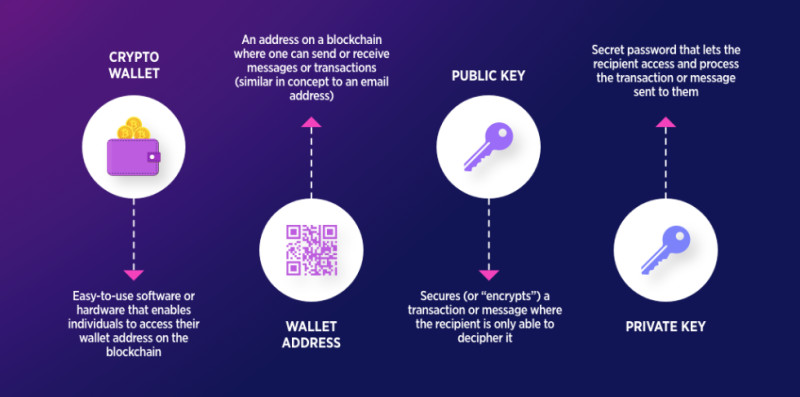
All crypto transactions take place on the blockchain, where each transaction is recorded. The coins don’t move from one wallet to another. To manage your storage and perform any transaction, you need two keys: a public key and a private key.
These keys are automatically generated as random sequences of letters and numbers when you create a wallet. The public key acts as your wallet address—you can share it with others to receive coins. The private key is a secret password that gives you access to your assets.
With these two keys, users can interact with the blockchain. This interaction is facilitated by the wallet, which displays your crypto balance, allows you to sign transactions, send funds, and more.
Types of crypto wallets
There are several types of wallets. To understand which Bitcoin wallet is the best, we need to look at each type and its key features. All wallets fall into two broad categories: hot and cold wallets. The main difference is that hot wallets are connected to the internet, while cold wallets are not.
Within these categories, we can distinguish the following types:
- Software wallets
Part of the hot wallet group, these are apps you download and install on your device—either a computer or a smartphone. They are divided into:
- Desktop wallets are installed on personal computers or laptops.
- Mobile wallets are used on smartphones via apps.
- 2. Online or web wallets
They are also hot wallets, but they don’t require any downloads. You can access them from any device with an internet connection by simply visiting the provider’s website and logging in with your credentials.
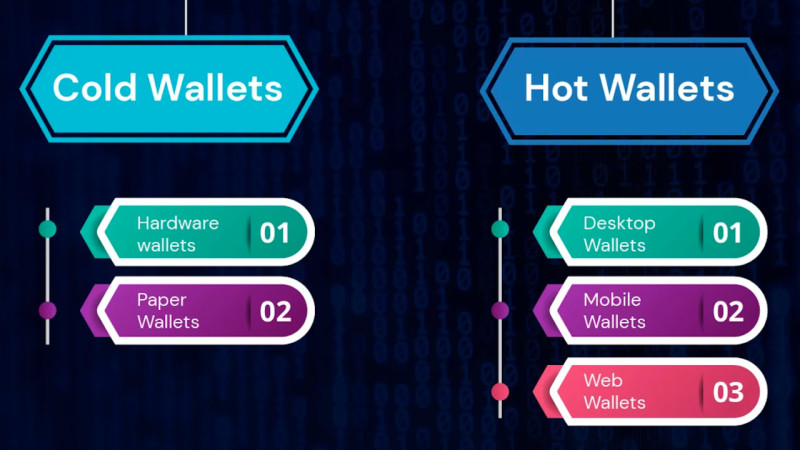
3. Hardware wallets
These are cold wallets. They are physical devices that resemble USB drives and connect to your PC via a USB port. Each has a small screen for displaying information.
4. Paper wallets
The simplest form of cold storage. Keys are printed out or written down manually and stored on paper. This method is quite secure and completely free of charge.
Now that we have a general understanding of the types of crypto wallets available, it's time to take a closer look at each one. By examining their main advantages and drawbacks, we’ll be able to identify the leaders and determine which wallet truly deserves to be called the best.
Software wallets
Software wallets are specialized applications that are downloaded onto a computer or smartphone. Wallets installed on personal computers are referred to as desktop wallets, while those installed on phones are called mobile wallets.
These types of wallets typically feature a simple and user-friendly interface, making them very convenient to use. In addition, exchange rates and transactions can be tracked in real time thanks to their internet connectivity. Let’s take a closer look at the strengths and weaknesses of these wallets.
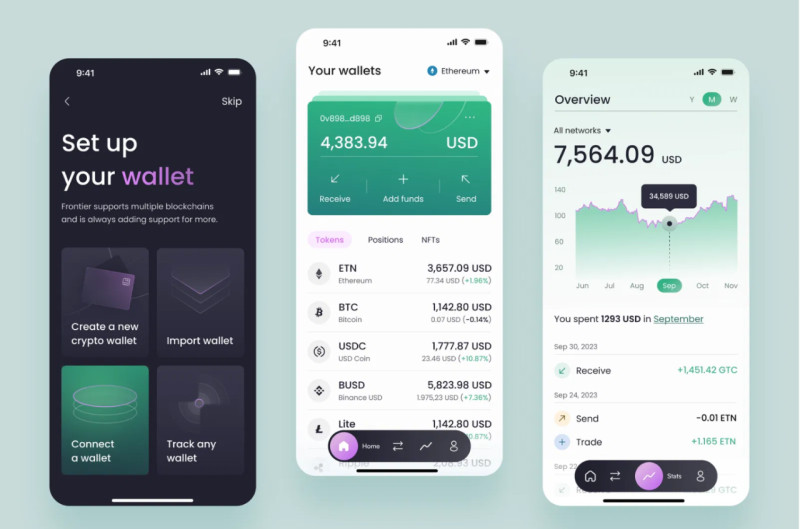
Key advantages include:
- Ease of use. These wallets are easy to operate and don’t require any special technical knowledge or skills.
- Low cost. Downloading and installing such wallets is usually free. Any usage fees typically come in the form of transaction fees, which are usually minimal.
- Compatibility with other services. These crypto wallets can be connected to various DeFi applications and cryptocurrency exchanges for trading and other transactions.
However, software wallets also have some disadvantages:
- Device dependency. Since the wallet is installed on a specific device, operations can only be performed from that device. If the battery dies, no transactions can be made. If the device malfunctions, gaining access to your assets can become very difficult.
- Offline limitations. These wallets require an internet connection, so most of their features become unavailable if you’re offline or have limited connectivity.
- Security vulnerabilities. Despite encryption and other protection methods, the constant internet connection makes these wallets more susceptible to malware, hacking, or other threats.
Online wallets
Web wallets are online services that allow you to access and manage your crypto assets from any device and from anywhere in the world. The only requirement is a stable internet connection. These wallets are often integrated with cryptocurrency exchanges or other platforms dealing with digital assets.
Most web wallets are custodial, meaning the storage and management of the wallet are handled by the service provider (e.g., an exchange), not by the user. This can be both an advantage and a disadvantage—it relieves the user of responsibility but introduces the risk of platform breaches.
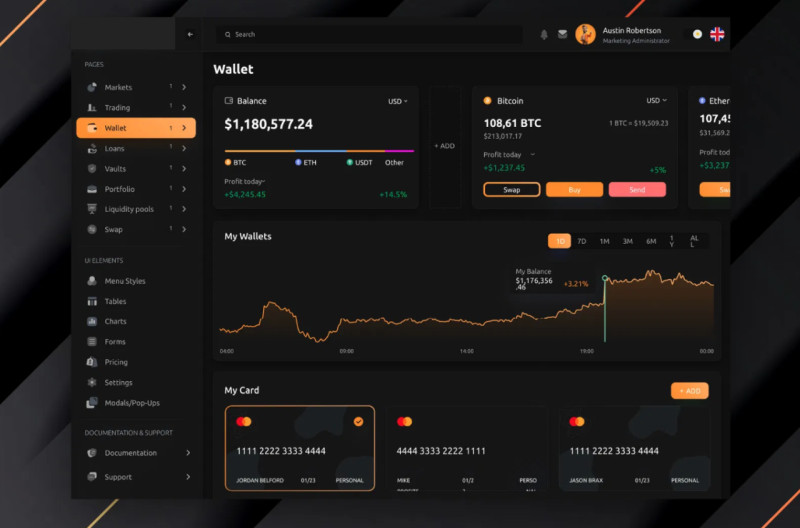
The main advantages of online wallets include:
- Easy access to assets. Web wallets can be used from any device without installing additional software, making transactions quick and convenient. There’s no need to rely on a single device, unlike with software wallets.
- User-friendly. Their intuitive interface makes it easy even for beginners to navigate and use these wallets.
- Wide functionality. Since web wallets are often linked to exchanges or other platforms, they offer a broad range of additional features such as converting crypto to fiat and vice versa, withdrawing funds to a card or bank account, and more.
- Backup options. Losing access or private keys is every wallet owner's nightmare. Some wallets offer backup and recovery features as an extra layer of protection.
On the downside, web wallets have a few notable weaknesses:
- Internet dependency. These wallets require a constant and stable internet connection to function properly. If you’re in an area with weak or unreliable internet, using the wallet can become difficult.
- Lower security. Web wallets are generally considered less secure than software or cold wallets. This is because the private keys are stored on the provider’s server, which could be compromised in a hacking attack.
- Fees. All transactions typically involve fees, and these are often set by the exchange or platform hosting the wallet. Besides, such platforms may impose withdrawal limits.
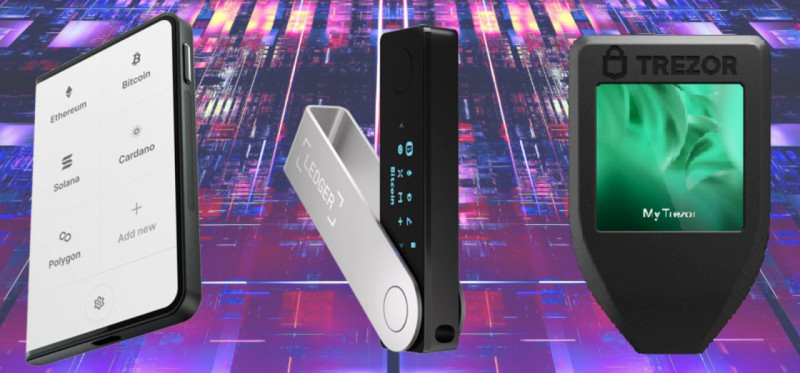
Hardware crypto wallets
Another strong contender for the title of “best Bitcoin wallet” is the hardware wallet. This is a physical device that, unlike all other types of wallets, can actually be touched and held. It provides offline storage of assets and operates independently, making it highly secure against internet-based threats.
Security is the top priority with this type of storage. Hardware wallets are ideal for long-term storage of cryptocurrencies. However, each time you need to perform a transaction, the device must be connected to an internet-enabled computer, making it less flexible compared to software or web wallets.
Key advantages of hardware wallets include:
- High level of security – These wallets are considered the most secure because the private keys are stored directly on the device rather than on a server, as is the case with web wallets.
- Full control over assets. Users have complete control over their funds without relying on third parties or intermediaries.
- Multi-currency support. Most hardware wallets allow users to manage multiple cryptocurrencies from one place, eliminating the need to create separate wallets for each type of crypto.
However, there are also several drawbacks:
- High cost. Quality hardware wallets from trusted manufacturers start at around €70 and can go up to €250 or more, which may be unaffordable for many users, especially beginners.
- Risk of counterfeit devices. If purchased from unofficial sellers or marketplaces, there is a risk of receiving not just a faulty device, but one preloaded with malware. Hackers could use such malware to later steal private keys.
- Risk of loss or damage. If the device is lost or damaged, access to the crypto assets may be lost forever. Unlike other wallet types, where access can be restored with a seed phrase or backup, it’s impossible without a functioning device.
- Device dependency. The hardware wallet must be physically present to perform any crypto-related operations. It cannot be used remotely without the actual device.
Paper wallets
The paper crypto wallet is the simplest form of key storage. But can it be considered the best Bitcoin wallet? Let’s weigh its pros and cons to find out. This storage method is accessible to absolutely anyone, since it's essentially just a piece of paper.
Despite its simplicity, this method provides strong protection against cybercriminals and hackers, as it’s impossible to access your notebook or piece of paper via the Internet. The public and private keys are either printed or manually written down (and in the printed version, they are often represented as QR codes).
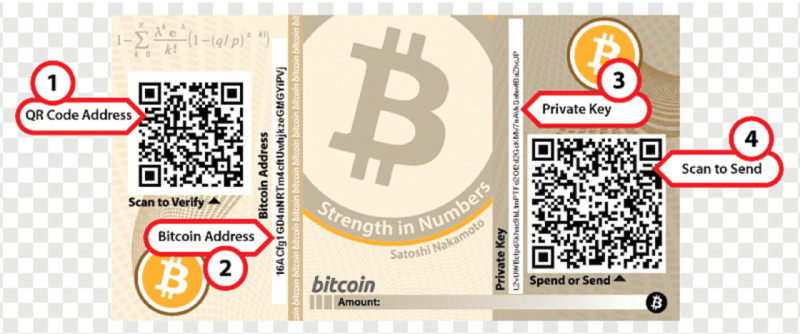
Main advantages of paper wallets:
- Security. As a form of “cold” storage, paper wallets are considered more secure than “hot” wallets. However, they are still less reliable than hardware wallets, which include several layers of data protection.
- Simplicity. There’s nothing complicated about using a paper wallet: simply print or write down your keys and store them in a safe place until you need them.
- Low cost. This is not only an inexpensive method of storing data — it’s completely free. You can print or write your keys on any sheet of paper.
- Backup capability. When using other types of wallets, such as online or software-based, paper wallets can serve as an additional backup for your keys, helping restore access if needed.
However, paper wallets also have their downsides:
- Printing issues. If the keys are printed with low-quality ink or on a poor printer, they may fade over time, making them harder to read and possibly unusable.
- Fragile storage medium. Paper is easily damaged by exposure to various elements. You must keep your wallet safe from sunlight, water, and fire — otherwise, access to your assets could be lost forever.
- Security of the device used for printing. Before printing the keys, you need to use a key generator on a device. If a public computer or shared printer is used, the keys could be intercepted by hackers even before they’re printed.
The best Bitcoin wallet
Now that we’ve thoroughly explored the advantages and disadvantages of each type of wallet, it’s time to compare them and identify the best Bitcoin wallet. However, keep in mind that it’s important not only to weigh the pros and cons of each crypto wallet but also to consider the user’s goals and needs.
For users who prefer long-term investments, cold storage is a better option. These types of wallets are generally more secure and help protect crypto assets from hacker attacks and other threats. Among cold wallets, hardware wallets are considered the safest, although they tend to be more expensive than other types.
For traders and users who use cryptocurrency daily for transactions or payments, quick access to funds is crucial. In that case, hot wallets are more suitable.
Let’s now compare key parameters of popular crypto wallets currently in high demand. A comparison table is provided below:
| Name | Type | Price | Security | Supported currencies |
| Trust Wallet | Software | Free | Medium | 100 blockchains |
| OKX Wallet | Software / online (exchange-linked) | Free | Medium | 70 blockchains |
| Bybit Wallet | Software / online (exchange-linked) | Free | Medium | 20 blockchains |
| Exodus | Software | Free | Medium | 50 blockchains |
| Ledger | Hardware | $80-400 | High | 5,500 cryptocurrencies |
| Tresor | Hardware | $50-180 | High | 9,000 cryptocurrencies |
| Safepal | Hardware + mobile app | $50-100 | High | 54 cryptocurrencies |
| Tangem | Hardware | $50-60 | High | 38 cryptocurrencies |
As you can see, some wallets are available in multiple formats, for example, both as mobile apps and web versions. This makes it possible to access your funds not only from your smartphone but also from any other device. However, wallets linked to crypto exchanges are typically more vulnerable to cyber threats.
Which Bitcoin wallet should you choose?
We’ve examined various types of crypto wallets and provided specific examples from each category. Taking into account all their features, pros, and cons, one conclusion becomes clear: there is no one-size-fits-all solution — the best Bitcoin wallet will vary depending on the user.

That said, here are the key criteria to consider when choosing a wallet:
- Security level
This is the top priority — make sure your private keys are well protected. It’s great if the wallet offers multiple layers of security, such as two-factor authentication, PIN codes to unlock the device, passwords for every transaction, etc. - Multi-currency support
Many modern wallets allow you to store keys for multiple cryptocurrencies. This is convenient, as you won’t need a separate wallet for each coin. - Value of crypto assets
If you’re investing large amounts, losing them would be a major setback. That’s why it's best to use trusted and secure wallets — especially hardware ones — for large investments. - Transaction frequency
If you transact often, constantly plugging in a hardware wallet can be inconvenient. In such cases, consider software or web wallets — but avoid storing large sums on them. - Wallet price
The cost of the wallet itself also matters. High-quality hardware wallets can be pricey, from $50 up to $400. It’s important to weigh this against the amount of crypto you plan to store. - Developer reputation
Before choosing a wallet, look into both the product and its creators. Check user reviews and consult rankings of the best wallets in the category that suits you. - Customer support
A reliable support team is a big advantage. Questions or issues with wallet usage can arise at any moment, and you need to know where to turn, especially in emergencies like unauthorized withdrawals.
Conclusion
In this article, we’ve tried to determine what the best Bitcoin wallet is, although there’s no single answer or universally agreed-upon opinion. There are several types of crypto wallets, each with its own pros and cons.
Cold wallets, such as hardware and paper wallets, are considered the most secure and reliable storage methods. However, if such a wallet is lost or damaged, access to your crypto assets may be lost forever. Additionally, they are not the most convenient option for day-to-day transactions.








 Back to articles
Back to articles



